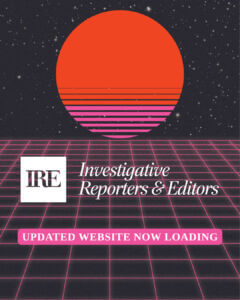IRE News
The 2025 Freelance Fellowship Recipients
IRE is excited to announce that the recipients of the 2025 IRE Freelance Fellowship are Jennifer Chowdhury and Molly Cotner! In their respective projects, Jennifer will investigate the U.S. government’s inconsistent approach to granting citizenship to children born through international surrogacy, while Molly will lead a community-centered investigation into the realities of the childcare crisis…
Read MoreCall for entries: 2025 IRE Awards
The 2025 Freelance Fellowship Recipients (Dec. 19, 2025) – It’s that time of year again! The 2025 IRE Awards are now open! We’re excited to announce a few new categories this year as well as a brand new contest platform. We’ve expanded the print/online, video and audio categories to include outstanding international investigations. Our existing…
Read MoreJoin us at The National Summit on Local News Preservation
This event seeks to bring together representatives from news and cultural heritage organizations. Editors, reporters, and journalists from all types of media organizations are encouraged to attend, as are archivists, librarians, and other heritage professionals.
Read MoreComing soon: a new IRE website
IRE members will soon be able to enjoy a new and improved website! “Staff and volunteers have been hard at work for long months to develop and test the new site — and now we’re about ready to launch,” said IRE Executive Director Diana Fuentes.”It shows IRE’s commitment to meaningful improvements that put members first,…
Read MoreCall for applications: Today’s News for Tomorrow
November 10, 2025 Content deletion. Link rot. Server disconnections. Site moves. Digital decay. The threads that chronicle the stories of your community could vanish without a trace. A 2019 study from the Reynolds Journalism Institute found that “the majority of news outlets had not given any thought to even basic strategies for preserving their digital…
Read MoreThe value of an IRE membership
These are trying times for many in journalism, but there is strength in numbers. If you’ve been thinking about joining IRE or renewing your membership, our fall membership drive is the perfect time to take action. Join today! Membership is just $75 per year for professionals, with a discounted rate of $50 for early-career professionals…
Read MoreAnnouncing IRE’s 2026 Chauncey Bailey Investigative Reporting Fellows
(Oct. 15, 2025) — Daniel Thomas Mollenkamp of EdSurge in Richmond, Virginia and Lea Zora Scruggs of KRIS 6/Scripps News in Corpus Christi, Texas have been selectedfor IRE’s Chauncey Bailey Journalist of Color Investigative Reporting Fellowship. The prestigious yearlong fellowship is designed to increase the range of backgrounds, experiences and interests within the field of…
Read MoreDonate to IRE: Shine a light. Fund the fight.
(October 1, 2025) — Journalism has the power to shine a light on the truth no matter how dark it gets. That’s what our membership at Investigative Reporters and Editors, nearly 5,000 journalists strong, prove day after day around the world. From local newspapers and TV stations, to global nonprofit newsrooms, they tirelessly follow leads, question…
Read MoreIRE statement on Pentagon press freedom constraints
(September 23, 2025) — Investigative Reporters & Editors and its Board of Directors join with numerous newsrooms and journalism organizations in condemning the Pentagon’s new requirement for reporters to sign a pledge limiting their ability to report without government approval in exchange for a press credential. “This unprecedented move undermines the fundamental principles of journalistic…
Read MoreDemanding release of detained journalist Mario Guevara
(September 23, 2025) — Investigative Reporters and Editors joins dozens of organizations in demanding the release of detained journalist Mario Guevara. Guevara was arrested June 14 in metro Atlanta while covering a protest, then transferred to Immigration and Customs Enforcement (ICE) custody, where he remains. He has been detained for more than 100 days —…
Read More The early bird deadline for
The early bird deadline for 
